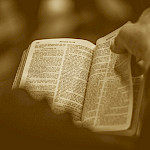Peter on the Water (2)
But it may be the reader feels disposed to condemn Peter for leaving the ship. He may think there was no need for his taking such a step. Why not abide with his brethren on board the vessel? Was it not possible to be quite as devoted to Christ in the ship as on the water? And, further, did not the sequel prove that it would have been far better, and safer, and wiser, for Peter to remain where he was, than to venture forth on a course which he was not able to pursue?
To all this we reply that our apostle was evidently governed by an earnest desire to be nearer to his Lord. And this was right. He saw Jesus walking on the water, and he longed to be with Him. And, further, he had the direct authority of his Lord for leaving the ship. We fully and freely grant that without this it would have been a fatal mistake to leave his position; but the moment that word "Come" fell on his ear he had a divine warrant for going forth upon the water — yea, to have remained would have been to miss great blessing.
Thus it is in every case. We must have authority before we can act in anything. Without this, the greater our zeal, energy, and apparent devotedness, the more fatal will be our mistake, and the more mischief we shall do to ourselves, to others, and to the cause of Christ. It is of the very last possible importance in every case, but especially where there is a measure of zeal, earnestness, and energy, that there should be sober subjection to the authority of the Word. If there be not this, there is no calculating the amount of mischief which may be done. If our devotedness flow not in the channel of simple obedience, if it rush over the embankments formed by the Word of God, the consequences must be most disastrous.
But there is another thing which stands next in importance to the authority of the divine Word, and that is the abiding realization of the divine presence. These two things must never be separated if we want to walk on the water. We may be quite clear and settled in our own minds, having distinct authority for any given line of action; but if we have not with equal distinctness the sense of the Lord's presence with us — if our eyes are not continually on the living God — we shall most assuredly break down.
This is very serious, and demands the gravest consideration of the Christian reader. It was precisely here that Peter failed. He did not fail in obedience, but in realized dependence. He acted on the word of Jesus in leaving the ship, but he failed to lean on the arm of Jesus in walking on the water; hence his terror and confusion. Mere authority is not enough; we want power. To act without authority is wrong. To act without power is impossible. The authority for starting is the Word. The power to proceed is the divine presence. The combination of the two must ever yield a successful career. It matters not in the smallest degree what the difficulties are if we have the stable authority of Holy Scripture for our course, and the blessed support of the presence of God in pursuing it. When God speaks, we must obey; but in order to do so, we must lean on His arm. "Have not I commanded you?" "Lo, I am with you."
Here are the two things so absolutely essential to every child of God and every servant of Christ. Without these, we can do nothing; with them, we can do all things. If we have not a "Thus saith the Lord," or "It is written" we cannot enter upon a path of devotedness, and if we have not His realized presence, we cannot pursue it. It is quite possible to be right in setting out, and yet to fail in going on.
It was so in the case of Simon Peter, and it has been so in the case of thousands since. It is one thing to make a good start, and another thing to make good progress. It is one thing to leave the ship, and another thing to walk on the water. Peter did the former but he failed in the latter. This beloved servant of Christ broke down in his course; but where did he find himself? In the arms of a loving Saviour. "Lord, save me!" How touching! How deeply affecting! He casts himself upon a well-known love — a love which was yet to meet him in far more humiliating circumstances. Nor was he disappointed. Ah, no! Blessed be God, no poor failing creature can ever appeal to that love in vain.
"And immediately Jesus stretched forth His hand, and caught him, and said unto him, O thou of little faith, wherefore didst thou doubt?" Exquisite grace! If Peter failed to reach his Lord, his Lord did not fail to reach him. If Peter failed in faith, Jesus could not fail in grace. Impossible. The grace of our Lord Jesus is exceeding abundant. He takes occasion from our very failures to display His rich and precious love. Oh, how blessed to have to do with such a tender, patient, loving Lord! Who would not trust Him and praise Him, love Him and serve Him?
Article series: Peter on the water
Peter on the Water (1)Previous article




